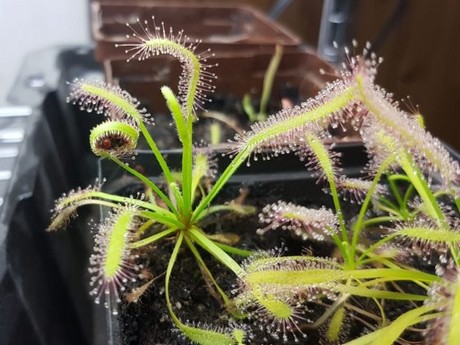Just like traditional farms, aquaponics farms have their fair share of problems dealing with pests.
The only difference is that when dealing with pests on an aquaponics farm is that the health of the fish has to be kept in mind. Several pest control methods work wonders on unwanted critters, but will also cause harm to fish.
One of the more interesting methods used to control pests at AquaGrow Farms is the use of carnivorous plants.
Carnivorous plants are interesting as their main source of nutrients do not come from the soil like normal plants. Instead, carnivorous plants prefer nutrient-less soils, nutrient-less water, and rely on light and insects to provide them with the nutrition they need to grow.
AquaGrow Farms currently has several species of carnivorous plants:
- Cape Sundew (Drosera capensis)
- North American Pitcher Plant (Sarracenia)
- Tropical Pitcher Plant (Nepenthes)

Pictured is a Cape Sundew, which forms sticky droplets of dew on its tentacles to attract prey. Flies and other insects are drawn to the sweet droplets and they become ensnared by the sticky hairs of the plant. Movement of the insects triggers the plant to slowly retract and close their tentacles – trapping their prey. At this point, the plant will also secrete enzymes to digest their meal.
If you look closely at the picture, you’ll see that the Sundew has caught a House Fly.
Carnivorous plants are not only interesting, but also a great way to cut down on the amount of pests on the farm. The plants seem to enjoy the free meal too.
For more information: AquaGrow Farms
AquaGrow Farms
www.aquagrowfarms.ca
